Partials Read online
PARTIALS
DAN WELLS
DEDICATION
This book is dedicated to the rule breakers,
the troublemakers, and the revolutionaries.
Sometimes the hand that feeds you needs a good bite.
CONTENTS
Cover
Title Page
Dedication
Part 1
Chapter One
Chapter Two
Chapter Three
Chapter Four
Chapter Five
Chapter Six
Chapter Seven
Chapter Eight
Chapter Nine
Chapter Ten
Chapter Eleven
Chapter Twelve
Part 2: Three Months Later
Chapter Thirteen
Chapter Fourteen
Chapter Fifteen
Chapter Sixteen
Chapter Seventeen
Chapter Eighteen
Chapter Nineteen
Chapter Twenty
Chapter Twenty-One
Chapter Twenty-Two
Chapter Twenty-Three
Chapter Twenty-Four
Chapter Twenty-Five
Chapter Twenty-Six
Chapter Twenty-Seven
Chapter Twenty-Eight
Part 3: Four Hours Later
Chapter Twenty-Nine
Chapter Thirty
Chapter Thirty-One
Chapter Thirty-Two
Chapter Thirty-Three
Chapter Thirty-Four
Chapter Thirty-Five
Chapter Thirty-Six
Chapter Thirty-Seven
Chapter Thirty-Eight
Chapter Thirty-Nine
Acknowledgments
About the Author
Credits
Copyright
About the Publisher
PART 1
CHAPTER ONE
Newborn #485GA18M died on June 30, 2076, at 6:07 in the morning. She was three days old. The average lifespan of a human child, in the time since the Break, was fifty-six hours.
They didn’t even name them anymore.
Kira Walker looked on helplessly while Dr. Skousen examined the tiny body. The nurses—half of them pregnant as well—recorded the details of its life and death, faceless in bodysuits and gas masks. The mother wailed despondently from the hallway, muffled by the glass. Ariel McAdams, barely eighteen years old. The mother of a corpse.
“Core temperature ninety-nine degrees at birth,” said a nurse, scrolling through the thermometer readout. Her voice was tinny through the mask; Kira didn’t know her name. Another nurse carefully transcribed the numbers on a sheet of yellow paper. “Ninety-eight degrees at two days,” the nurse continued. “Ninety-nine at four o’clock this morning. One-oh-nine point five at time of death.” They moved softly through the room, pale green shadows in a land of the dead.
“Just let me hold her,” cried Ariel. Her voice cracked and broke. “Just let me hold her.”
The nurses ignored her. This was the third birth this week, and the third death; it was more important to record the death, to learn from it—to prevent, if not the next one, then the one after that, or the hundredth, or the thousandth. To find a way, somehow, to help a human child survive.
“Heart rate?” asked another nurse.
I can’t do this anymore, thought Kira. I’m here to be a nurse, not an undertaker—
“Heart rate?” asked the nurse again, her voice insistent. It was Nurse Hardy, the head of maternity.
Kira snapped back to attention; monitoring the heart was her job. “Heart rate steady until four this morning, spiking from 107 to 133 beats per minute. Heart rate at five o’clock was 149. Heart rate at six was 154. Heart rate at six-oh-six was … 72.”
Ariel wailed again.
“My figures confirm,” said another nurse. Nurse Hardy wrote the numbers down but scowled at Kira.
“You need to stay focused,” she said gruffly. “There are a lot of medical interns who would give their right eye for your spot here.”
Kira nodded. “Yes, ma’am.”
In the center of the room Dr. Skousen stood, handed the dead infant to a nurse, and pulled off his gas mask. His eyes looked as dead as the child. “I think that’s all we can learn for now. Get this cleaned up, and prepare full blood work.” He walked out, and all around Kira the nurses continued their flurry of action, wrapping the baby for burial, scrubbing down the equipment, sopping up the blood. The mother cried, forgotten and alone—Ariel had been inseminated artificially, and there was no husband or boyfriend to comfort her. Kira obediently gathered the records for storage and analysis, but she couldn’t stop looking at the sobbing girl beyond the glass.
“Keep your head in the game, intern,” said Nurse Hardy. She pulled off her mask as well, her hair plastered with sweat to her forehead. Kira looked at her mutely. Nurse Hardy stared back, then raised her eyebrow. “What does the spike in temperature tell us?”
“That the virus tipped over the saturation point,” said Kira, reciting from memory. “It replicated itself enough to overwhelm her respiratory system, and the heart started overreaching to try to compensate.”
Nurse Hardy nodded, and Kira noticed for the first time that her eyes were raw and bloodshot. “One of these days the researchers will find a pattern in this data and use it to synthesize a cure. The only way they’re going to do that is if we…?” She paused, waiting, and Kira filled in the rest.
“Track the course of the disease through every child the best we can, and learn from our mistakes.”
“Finding a cure is going to depend on the data in your hands.” Nurse Hardy pointed at Kira’s papers. “Fail to record it, and this child died for nothing.”
Kira nodded again, numbly straightening the papers in her manila folder.
The head nurse turned away, but Kira tapped her on the shoulder; when she turned back, Kira didn’t dare to look her in the eye. “Excuse me, ma’am, but if the doctor’s done with the body, could Ariel hold it? Just for a minute?”
Nurse Hardy sighed, weariness cracking through her grim, professional facade. “Look, Kira,” she said. “I know how quickly you breezed through the training program. You clearly have an aptitude for virology and RM analysis, but technical skills are only half the job. You need to be ready, emotionally, or the maternity ward will eat you alive. You’ve been with us for three weeks—this is your tenth dead child. It’s my nine hundred eighty-second.” She paused, her silence dragging on longer than Kira expected. “You’ve just got to learn to move on.”
Kira looked toward Ariel, crying and beating on the thick glass window. “I know you’ve lost a lot of them, ma’am.” Kira swallowed. “But this is Ariel’s first.”
Nurse Hardy stared at Kira for a long time, a distant shadow in her eyes. Finally she turned. “Sandy?”
Another young nurse, who was carrying the tiny body to the door, looked up.
“Unwrap the baby,” said Nurse Hardy. “Her mother is going to hold her.”
Kira finished her paperwork about an hour later, just in time for the town hall meeting with the Senate. Marcus met her in the lobby with a kiss, and she tried to put the long night’s tension behind her. Marcus smiled, and she smiled back weakly. Life was always easier with him around.
They left the hospital, and Kira blinked at the sudden burst of natural sunlight on her exhausted eyes. The hospital was like a bastion of technology in the center of the city, so different from the ruined houses and overgrown streets it may as well have been a spaceship. The worst of the mess had been cleaned up, of course, but the signs of the Break were still everywhere, even eleven years later: abandoned cars had become stands for fish and vegetables; front lawns had become gardens and chicken runs. A world that had
been so civilized—the old world, the world from before the Break—was now a borrowed ruin for a culture one step up from the Stone Age. The solar panels that powered the hospital were a luxury most of East Meadow could only dream of.
Kira kicked a rock in the road. “I don’t think I can do this anymore.”
“You want a rickshaw?” asked Marcus. “The coliseum’s not that far.”
“I don’t mean walk,” said Kira, “I mean this—the hospital, the infants. My life.” She remembered the eyes of the nurses, pale and bloodshot and tired—so very tired. “Do you know how many babies I’ve watched die?” she asked softly. “Personally watched, right there, right in front of me.”
Marcus took her hand. “It’s not your fault.”
“Does it matter whose fault it is?” asked Kira. “They’re just as dead.”
“No one has saved a child since the Break,” said Marcus, “no one. You’re a three-week intern in there. You can’t beat yourself up for not doing something even the doctors and researchers haven’t been able to do.”
Kira stopped, staring at him; he couldn’t be serious. “Are you trying to make me feel better?” she asked. “Because telling me it’s impossible to save a baby’s life is a really stupid way of doing it.”
“You know that’s not what I mean,” said Marcus. “I’m just saying it’s not you, personally. RM killed those children, not Kira Walker.”
Kira glanced out across the widening turnpike. “That’s one way of looking at it.”
The crowd was getting heavier now as they approached the coliseum; they might even fill it, which they hadn’t done in months. Not since the Senate passed the latest amendment to the Hope Act, dropping the pregnancy age to eighteen. Kira felt a sudden knot in her stomach and grimaced. “What do you think the ‘emergency meeting’ is about?”
“Knowing the Senate, something boring. We’ll get a seat by the door so we can slip out if Kessler goes off on another tirade.”
“You don’t think it’ll be important?” asked Kira.
“It will at least be self-important,” said Marcus. “You can always rely on the Senate for that.” He smiled at her, saw how serious she was, and frowned. “If I had to guess, I’d say they’re going to talk about the Voice. The word in the lab this morning was that they attacked another farm this week.”
Kira looked at the sidewalk, studiously avoiding his eyes. “You don’t think they’re going to lower the pregnancy age again?”
“So soon?” asked Marcus. “It hasn’t even been nine months yet—I don’t think they’d drop it again before the eighteen-year-olds even come to term.”
“They would,” Kira said, still looking down. “They would, because the Hope Act is the only way they know how to deal with the problem. They think if we have enough babies, one of them’s bound to be resistant, but it isn’t working, and it hasn’t worked for eleven years, and getting a bunch of teenagers pregnant is not going to change that.” She let go of Marcus’s hand. “It’s the same thing in the hospital: They take care of the moms, they keep everything sterile, they record all the data, and the infants are still dying. We know exactly how they’re dying—we know so much about how they’re dying it makes me sick just to think about it—but we know absolutely nothing about how to save them. We get a bunch of new girls pregnant, and all we’re going to have are more dead babies and more notebooks full of the same exact statistics for how those babies died.” She felt her face grow hot, tears coming behind her eyes. Some of the other people were looking at her as they passed on the road; many of the women were pregnant, and Kira was certain some of them had heard her. She swallowed and hugged herself tightly, angry and embarrassed.
Marcus stepped closer and put his arm around her shoulder. “You’re right,” he whispered. “You’re absolutely right.”
She leaned into him. “Thank you.”
Someone shouted through the crowd. “Kira!”
Kira looked up, wiping her eyes with the back of her hand. Madison was weaving through the press of people, waving excitedly. Kira couldn’t help but smile. Madison was a couple years older, but they’d grown up together, practically sisters in the makeshift family they’d formed after the Break. She raised one hand and waved back.
“Mads!”
Madison reached them and hugged Kira excitedly. Her new husband, Haru, followed a few steps behind. Kira didn’t know him well; he’d been in the Defense Grid when he and Madison met, and only transferred into civilian duty when they’d gotten married a few months ago. He shook her hand and nodded solemnly to Marcus. Kira wondered again how Madison could fall for someone so serious, but she supposed everyone was serious compared to Marcus.
“It’s good to see you,” said Haru.
“You can see me?” asked Marcus, patting himself in sudden shock. “The potion must have worn off! That’s the last time I give my lunch to a talking squirrel.”
Madison laughed, and Haru raised his eyebrow, confused. Kira watched him, waiting, until his lack of humor was so funny she couldn’t help herself and burst into laughter as well.
“How are you guys doing?” asked Madison.
“Surviving,” said Kira. “Barely.”
Madison grimaced. “Rough night in maternity?”
“Ariel had her baby.”
Madison went pale, and her eyes drooped in genuine sadness. Kira could see how much it hurt her, now that she was almost eighteen. Madison wasn’t pregnant yet, but it was only a matter of time. “I’m so sorry. I’ll follow you back after the meeting to say hi to her, and see if there’s anything I can do.”
“That’s a good idea,” said Kira, “but you’ll have to do it without me—we have a salvage run today.”
“But you were up all night!” Madison protested. “They can’t make you do a salvage run.”
“I’ll grab a nap before leaving,” said Kira, “but I need to go—I’ve been falling apart at work, and I could use the change of pace. Plus I need to prove to Skousen that I can handle it. If the Defense Grid wants a medic on their salvage run, I’ll be the best damn medic they’ve ever seen.”
“They’re lucky to have you,” said Madison, hugging her again. “Is Jayden going?”
Kira nodded. “He’s the sergeant in charge.”
Madison smiled. “Give him a hug for me.” Jayden and Madison were siblings—not adopted siblings, actual birth siblings, the only direct genetic relatives left in the world. They were proof, some said, that RM immunity could be inherited, which only made it more frustrating that so far none of the newborns had done it. More likely, Kira thought, Madison and Jayden were an anomaly that might never be repeated.
Jayden was also, as Kira often informed Madison, one of the more attractive human beings left on the planet. Kira glanced impishly at Marcus. “Just a hug? I could pass along a kiss or two.”
Marcus looked awkwardly at Haru. “So. Any idea what the meeting’s gonna be about?”
Kira and Madison laughed, and Kira sighed happily. Madison always made her feel better.
“They’re closing the school,” said Haru. “The youngest kids on the island are turning fourteen, and there are practically more teachers now than students. I’m guessing they’re going to graduate everyone into trade programs early, and send the teachers somewhere they can be more useful.”
“You think?” asked Kira.
Haru shrugged. “It’s what I’d do.”
“They’re probably going to yak about the Partials again,” said Madison. “The Senate can never shut up about those things.”
“Can you blame them?” asked Haru. “They killed everyone on Earth.”
“Present company excepted,” said Marcus.
“I’m not saying they weren’t dangerous,” said Madison, “but it’s been eleven years since anyone has seen one. Life goes on. Besides, we’ve clearly got bigger problems now. I’m guessing they’re going to talk about the Voice.”
“We’ll find out soon enough, I guess,” said Kira, nodding t
oward the north; the coliseum was just visible beyond the trees. The Senate had its own building, of course, in an actual town hall, but “town hall” meetings like this one, where the entire city was asked to attend, were held in the coliseum. They rarely filled it, but the adults said it used to fill up all the time, back in the old days when they’d used it for sports. Before the Break.
Kira had only been five years old in the Break; most things about the old world she couldn’t even remember, and she didn’t trust half the things she could. She remembered her father, his dark face and his messy black hair and his thick-framed glasses pushed up on the bridge of his nose. They had lived in a split-level house—she was fairly certain it was yellow—and when she turned three she had a birthday party. She didn’t have any friends her age, so there were no little kids, but most of her father’s friends were there. She remembered she’d had a big toy box full of stuffed animals, and she’d wanted to show it to everyone, so she’d puffed and strained and pushed it down the hall; it seemed like a half an hour or more in her mind, but she knew it couldn’t have been that long in real life. When she’d finally reached the living room and shouted for everyone to look, her father had laughed and chided her and taken the whole thing back to her bedroom. All her effort, gone in seconds. The memory didn’t bother her; she never thought of her father as mean or unjust. It was simply a memory, one of the few she had of her life in the old world.
The crowd was heavy now, pressing together as they passed through the trees around the coliseum. Kira held tight to Marcus with one hand and Madison with the other, Haru trailing off the back like the end of a human chain. They wove a path through the mass of people and found a row of empty seats—near a door, like Marcus wanted. Kira knew he was right: If Senator Kessler got off on another rant, or if Senator Lefou got talking about shipping schedules or whatever boring thing he was on about this month, they’d need an easy way to slip out. Mandatory attendance was one thing, but once the important stuff was over, they wouldn’t be the only ones leaving early.
As the senators filed onto the dais in the center of the floor, Kira shifted uncomfortably in her seat, wondering if Haru would be right. There were twenty senators in all, and Kira recognized just about all of them, though she didn’t know all their names. One of the men, though, was new: tall, dark, powerfully built. He stood like a military officer, but his suit was simple and civilian. He whispered something to Dr. Skousen, the Senate representative from the hospital, then slipped away into the crowd.

 Partials
Partials The Devil's Only Friend
The Devil's Only Friend Isolation
Isolation I Don't Want to Kill You
I Don't Want to Kill You Ones and Zeroes
Ones and Zeroes Next of Kin
Next of Kin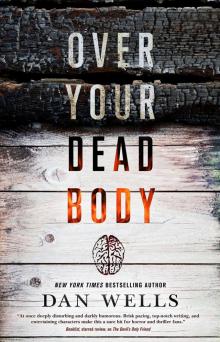 Over Your Dead Body
Over Your Dead Body Fragments
Fragments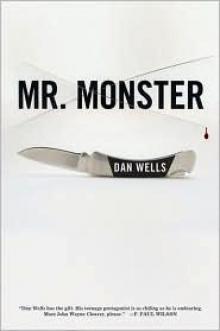 Mr. Monster
Mr. Monster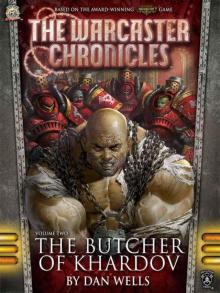 The Butcher of Khardov
The Butcher of Khardov I AM NO T A S E RI AL KI L L E R
I AM NO T A S E RI AL KI L L E R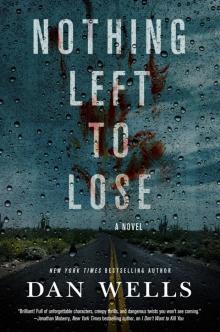 Nothing Left to Lose--A Novel
Nothing Left to Lose--A Novel Active Memory
Active Memory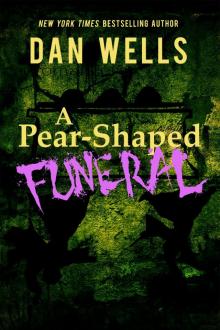 A Pear-Shaped Funeral
A Pear-Shaped Funeral I Am Not a Serial Killer
I Am Not a Serial Killer Bluescreen
Bluescreen Ruins
Ruins Zero G
Zero G The Hollow City
The Hollow City Extreme Makeover
Extreme Makeover Partials p-1
Partials p-1 The Complete John Wayne Cleaver Series: I Am Not a Serial Killer, Mr. Monster, I Don't Want to Kill You, Devil's Only Friend, Over Your Dead Body, Nothing Left to Lose
The Complete John Wayne Cleaver Series: I Am Not a Serial Killer, Mr. Monster, I Don't Want to Kill You, Devil's Only Friend, Over Your Dead Body, Nothing Left to Lose